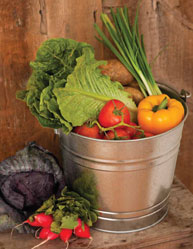By Shivangi Kelkar
 In the March 2012 issue of Food Technology magazine, the front-page article titled ‘Is the Pathway to Health Organic?’ by Toni Tarver addressed the topic of organic foods and their relevant health benefits.
In the March 2012 issue of Food Technology magazine, the front-page article titled ‘Is the Pathway to Health Organic?’ by Toni Tarver addressed the topic of organic foods and their relevant health benefits.
The organic food industry has grown tremendously in the last few years, asserting superior taste, nutrition, and safety compared to conventionally grown produce. The organic food industry has proclaimed that organic foods contain higher amounts of polyphenols, antioxidants, and flavonoids that can diminish heart diseases and reverse the rising obesity and diabetes epidemic. These claims are logical according to the author, since fruits and vegetables cultivated without synthetic fertilizers (i.e. organic) will retain higher contents of antioxidants and other nutrients in comparison to conventionally grown produce. Studies have shown that the compounds found in synthetic fertilizers disrupt endocrine functions and cause tumors in rodents. Researchers have also found higher antioxidant content in many fruits produced by organic methods.
However, a large number of research studies contradict the benefits of organic foods. Pesticide residues in conventional produce have been found to be statistically insignificant over organic produce. Hence, the health outcomes of organic foods are, at best, uncertain. Some studies also state that more than half of naturally occurring pesticides and chemicals in organic foods can qualify as carcinogens.
In the article, a biochemist rightly summed up the debate, saying that greater emphasis should be on consuming fruits and vegetables, regardless of their cultivation. A food toxicologist offered a similar perspective that dosage of pesticides, synthetic or natural, is critical to ascertain their toxicity. The advice was that consumers should buy the best cost-effective produce. The selection should be based on the quality, taste, and smell of the produce. Questions were also raised about sustainability of organic produce for a world with an exponentially growing population.
 The author concludes by suggesting that support for organic foods should be for environmental reasons, helping local farmers, and hesitation about genetically modified produce. Flip open to the story on page 27 of the latest Food Technology magazine (March 2012 issue) and read the article for further detail. What is your stance on this topic and why do you feel the way that you do?
The author concludes by suggesting that support for organic foods should be for environmental reasons, helping local farmers, and hesitation about genetically modified produce. Flip open to the story on page 27 of the latest Food Technology magazine (March 2012 issue) and read the article for further detail. What is your stance on this topic and why do you feel the way that you do?




